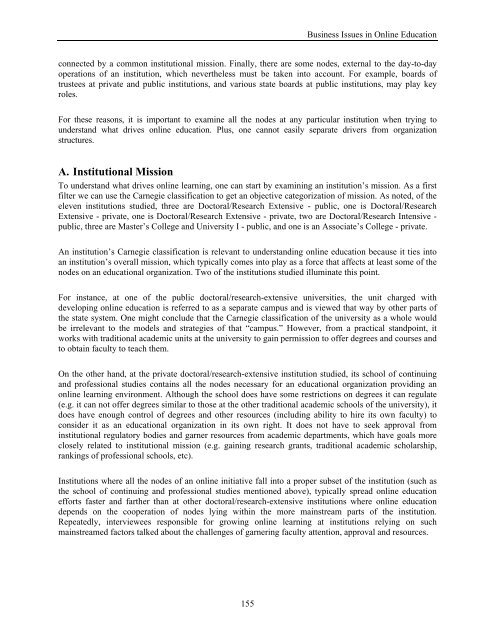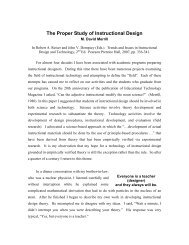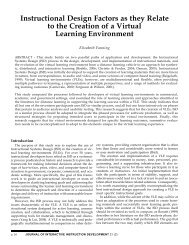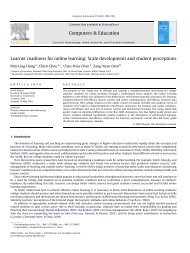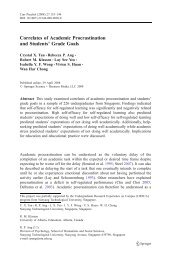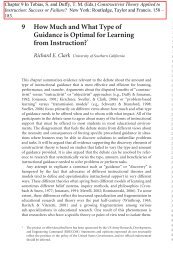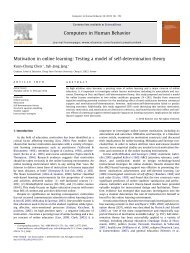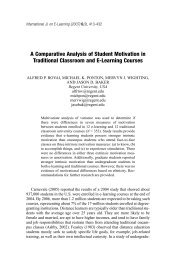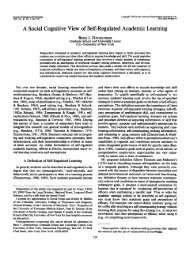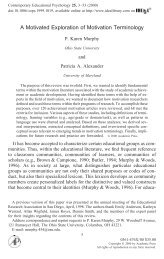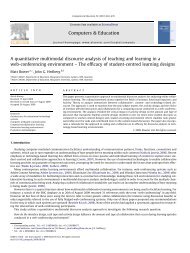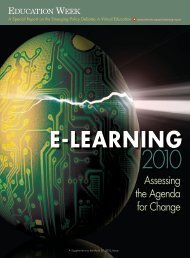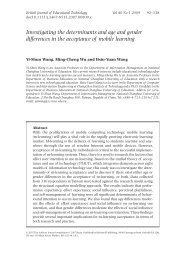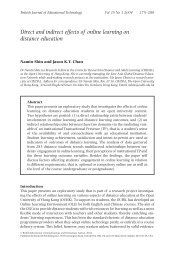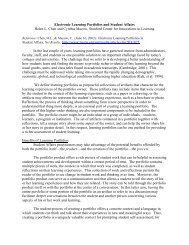Elements of Quality Online Education cation
Elements of Quality Online Education cation
Elements of Quality Online Education cation
You also want an ePaper? Increase the reach of your titles
YUMPU automatically turns print PDFs into web optimized ePapers that Google loves.
Business Issues in <strong>Online</strong> <strong>Edu<strong>cation</strong></strong>connected by a common institutional mission. Finally, there are some nodes, external to the day-to-dayoperations <strong>of</strong> an institution, which nevertheless must be taken into account. For example, boards <strong>of</strong>trustees at private and public institutions, and various state boards at public institutions, may play keyroles.For these reasons, it is important to examine all the nodes at any particular institution when trying tounderstand what drives online edu<strong>cation</strong>. Plus, one cannot easily separate drivers from organizationstructures.A. Institutional MissionTo understand what drives online learning, one can start by examining an institution’s mission. As a firstfilter we can use the Carnegie classifi<strong>cation</strong> to get an objective categorization <strong>of</strong> mission. As noted, <strong>of</strong> theeleven institutions studied, three are Doctoral/Research Extensive - public, one is Doctoral/ResearchExtensive - private, one is Doctoral/Research Extensive - private, two are Doctoral/Research Intensive -public, three are Master’s College and University I - public, and one is an Associate’s College - private.An institution’s Carnegie classifi<strong>cation</strong> is relevant to understanding online edu<strong>cation</strong> because it ties intoan institution’s overall mission, which typically comes into play as a force that affects at least some <strong>of</strong> thenodes on an edu<strong>cation</strong>al organization. Two <strong>of</strong> the institutions studied illuminate this point.For instance, at one <strong>of</strong> the public doctoral/research-extensive universities, the unit charged withdeveloping online edu<strong>cation</strong> is referred to as a separate campus and is viewed that way by other parts <strong>of</strong>the state system. One might conclude that the Carnegie classifi<strong>cation</strong> <strong>of</strong> the university as a whole wouldbe irrelevant to the models and strategies <strong>of</strong> that “campus.” However, from a practical standpoint, itworks with traditional academic units at the university to gain permission to <strong>of</strong>fer degrees and courses andto obtain faculty to teach them.On the other hand, at the private doctoral/research-extensive institution studied, its school <strong>of</strong> continuingand pr<strong>of</strong>essional studies contains all the nodes necessary for an edu<strong>cation</strong>al organization providing anonline learning environment. Although the school does have some restrictions on degrees it can regulate(e.g. it can not <strong>of</strong>fer degrees similar to those at the other traditional academic schools <strong>of</strong> the university), itdoes have enough control <strong>of</strong> degrees and other resources (including ability to hire its own faculty) toconsider it as an edu<strong>cation</strong>al organization in its own right. It does not have to seek approval frominstitutional regulatory bodies and garner resources from academic departments, which have goals moreclosely related to institutional mission (e.g. gaining research grants, traditional academic scholarship,rankings <strong>of</strong> pr<strong>of</strong>essional schools, etc).Institutions where all the nodes <strong>of</strong> an online initiative fall into a proper subset <strong>of</strong> the institution (such asthe school <strong>of</strong> continuing and pr<strong>of</strong>essional studies mentioned above), typically spread online edu<strong>cation</strong>efforts faster and farther than at other doctoral/research-extensive institutions where online edu<strong>cation</strong>depends on the cooperation <strong>of</strong> nodes lying within the more mainstream parts <strong>of</strong> the institution.Repeatedly, interviewees responsible for growing online learning at institutions relying on suchmainstreamed factors talked about the challenges <strong>of</strong> garnering faculty attention, approval and resources.155


